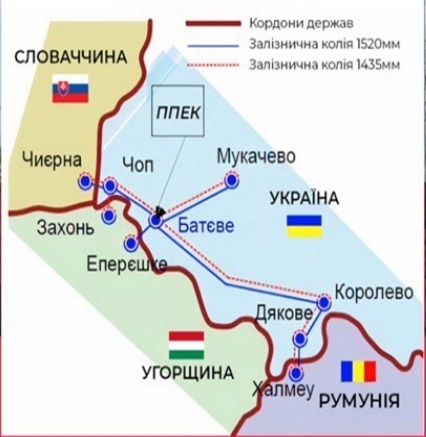Transcarpathia as an alternative logistics route in the conditions of the blockade

Recent events on the border between Poland and Ukraine have caused serious difficulties with the export of agricultural products. Farmers from Poland organized a blockade of border crossings, protesting against the import of Ukrainian grain, which, in their opinion, creates unfair competition and threatens local markets.
For Ukraine, this situation has become a real challenge that requires a complex solution, because Ukrainian farmers depend on the export of their products to world markets, including the EU market and Poland in particular. Blocking borders creates problems with logistics and disrupts supply plans, which can negatively affect the country's economy. The situation was fueled by an agreement signed on March 20 in Poland between farmers and the Polish Minister of Agriculture. One of the points of the document stipulates that the Minister of Agriculture should ask Prime Minister Donald Tusk to suspend the transit of agricultural products from Ukraine, which is covered by the embargo, through the territory of Poland.
Against the background of these problems, logistics through Transcarpathia is a real alternative to the blocked border with Poland. By using the region's rail infrastructure, businesses can create new logistics routes and ensure seamless transportation of goods across Eastern Europe. So it is possible to minimize disruptions in supply chains and open up new opportunities for trade and cooperation.
FIRST FUEL AND ENERGY COMPANY is located at the Batyovo station of the Lviv Railway. The company's multifunctional terminal allows you to send / receive cargo bypassing the blocked Polish border through Slovakia and Hungary. The terminal has an asphalt road and railway tracks. The infrastructure of the enterprise allows to carry out work with 2 trains at the same time and keep 2 more trains in storage.
The terminal executes orders for transshipment of various types of cargo:
- Bulk cargo. The transshipment capacity is about 1,000 tons per day. Overloading from wagon to wagon, from wagon to car, from car to wagon is possible. The terminal has automobile scales up to 120 tons);
- Oil. The daily transshipment capacity is more than 1,000 tons per day. Oil dosing is carried out using a flow meter followed by weighing on railway scales. The following overload options are possible: from car to car, from car to car, from car to car, from car to car. It is possible to download flexes;
- Liquefied gas. The transshipment capacity is about 500 tons per day. Weight control is carried out on our own railway scales. It is possible to transfer from a car to a car, from a car to a car, from a car to a car;
- Big bags / fertilizers. Overloading of big bags is carried out with the help of a gantry crane with a carrying capacity of 20 tons. Overloading from car to car, from car to car, from car to car is possible. If necessary, storage at the terminal site is possible. Weight control can be carried out on own railway and car scales;
- Transshipment of meal and artificial cargoes.
The terminal also provides services for customs clearance/clearance of cargo, dosing of cargo, obtaining phytosanitary and veterinary certificates, payment of railway fares, registration of railway documents, marking, sealing, etc.
I would like to note that the presence of such terminals allows cargo owners and logistics companies not only to rebuild logistics chains bypassing the blocked border with Poland without particular problems, but also to diversify the cargo flow that goes to the ports of the Danube and the Black Sea. Moreover, thanks to the support of innovative solutions and investments in the infrastructure of the region by such businesses, Transcarpathia can become a key player in the railway logistics revolution in the future.
+38063-333-41-40


